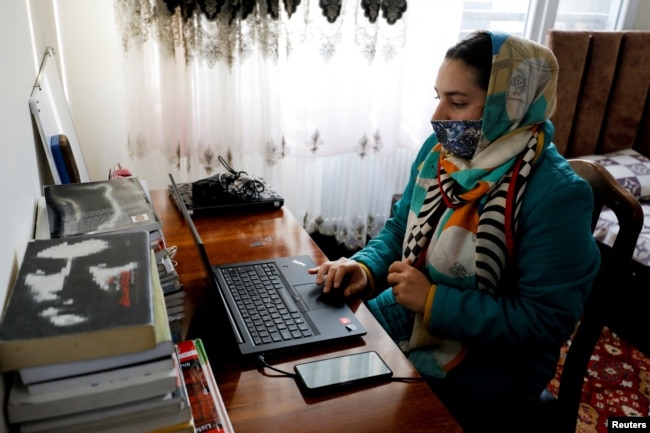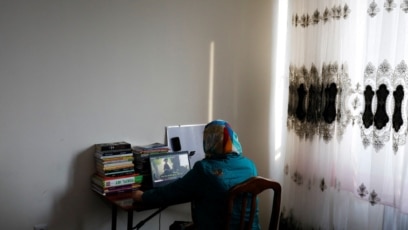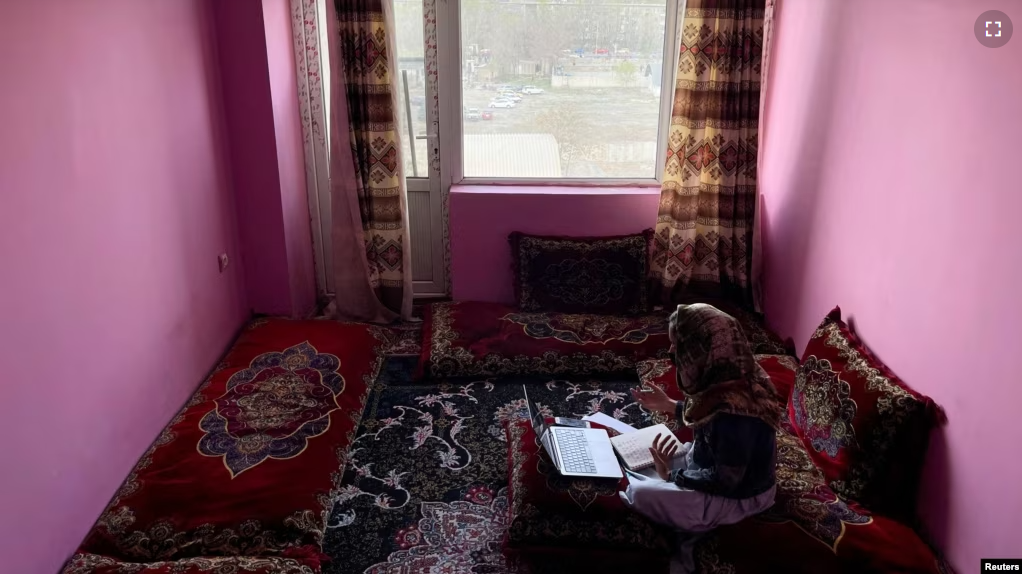There are a growing number of educational centers trying to reach Afghanistan’s girls and women through online classes in their homes.
Sofia is an Afghan student taking an online English course.
But when the teacher calls on Sofia to read, her computer screen freezes. After a while, her computer comes back to life.
“As usual,” a fellow student said.
Twenty-two-year-old Sofia is one of a growing number of Afghan girls and women learning online to avoid the ruling Taliban’s restrictions on girls’ education.
Taliban officials have closed girls’ high schools, and barred women and girls from universities. They also have prevented most women from working at non-governmental organizations.
However, one of the biggest changes since the Taliban were first in power from 1996 to 2001 has been the growth of the internet. Almost no one had internet service when the Taliban were forced from power in the weeks following the September 11, 2001, attacks on the United States.
The World Bank estimated that, after nearly 20 years of the Western intervention, 18 percent of the population had internet service.
The Taliban administration has permitted girls to study individually at home. It also has not moved to ban the internet, which its officials use to make announcements on social media.
But girls and women face many barriers to learning. These include loss of electricity and very slow internet speeds. Computers and Wi-Fi, local wireless internet service, are also very costly in a country where 97 percent of people live in poverty.
“For girls in Afghanistan, we have a bad, awful internet problem,” Sofia said.
Her online school, Rumi Academy, had enrollment of mostly females rise from about 50 students to more than 500 after the Taliban took over in 2021.
It has had hundreds of additional applications. But a representative of the school said it cannot enroll them because it does not have enough money for teachers, equipment and internet.
Sakina Nazari tried taking an online language class from her home in the west of Kabul for a week after she was forced to leave her university in December. But she stopped attending after many problems.
“I couldn’t continue,” she said. “It’s too hard to access internet in Afghanistan and sometimes we have half an hour of power in 24 hours.”
The company Ookla, based in the American city of Seattle, Washington, measures internet speeds around the world. It said Afghanistan’s mobile internet is the slowest of 137 countries.
Some Afghans have started calling on SpaceX head Elon Musk to introduce his satellite internet service called Starlink in Afghanistan. Starlink is operating in Ukraine and Iran.

Online schools are trying to help Afghanistan’s students.
Daniel Kalmanson is a spokesperson for the online University of the People based in Pasadena, California. The school has had more than 15,000 applications from Afghan girls and women since the Taliban took over.
Kalmanson said students can attend classes at any time that conditions permit. He also said teachers give extensions to students for assignments and tests when they face connection problems.
LEARN Afghanistan is a nonprofit group that operates several community-based schools. Some teachers hold their classes online and make lesson plans free in Afghanistan’s main languages.
Executive director Pashtana Durrani said the group also makes lessons available on radio, which is widely used in rural areas. She has been working with international companies to find ways to solve the problem of poor internet service.
“Afghanistan needs to be a country where the internet is accessible, digital devices need to be pumped in,” Durrani said.
I’m Dan Novak.
Dan Novak adapted this story for VOA Learning English based on reporting by Reuters.
Quiz- Afghan Girls Struggle with Internet for Online Classes

Start the Quiz to find out
______________________________________________________________
Words in This Story
awful — adj. extremely bad or unpleasant
enrollment — n. the process by which parents send children to schools or young people are able to attend college
access –v. the be able to gain use of something, usually through a number of steps
extension — n. an additional period of time to complete a job or task
assignment –n. a job, task or especially a piece of schoolwork that is given to someone to be done at a later time or in a period of time
lesson –n. an activity done to learn
